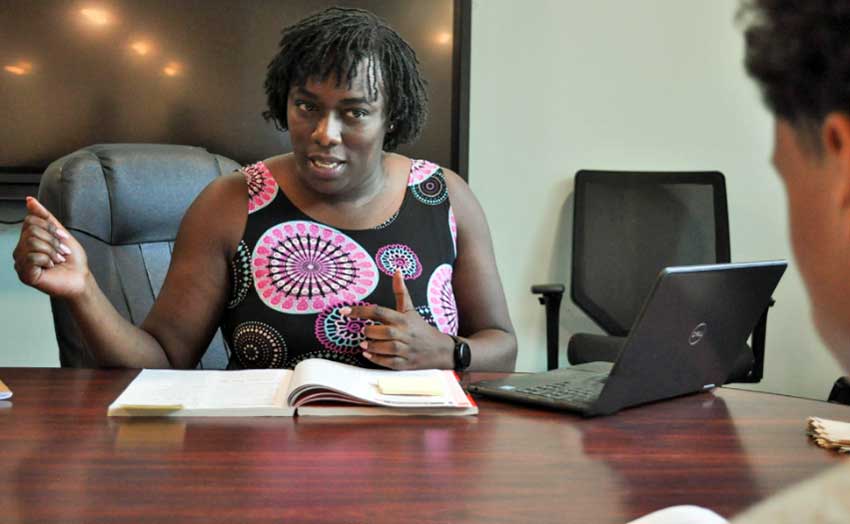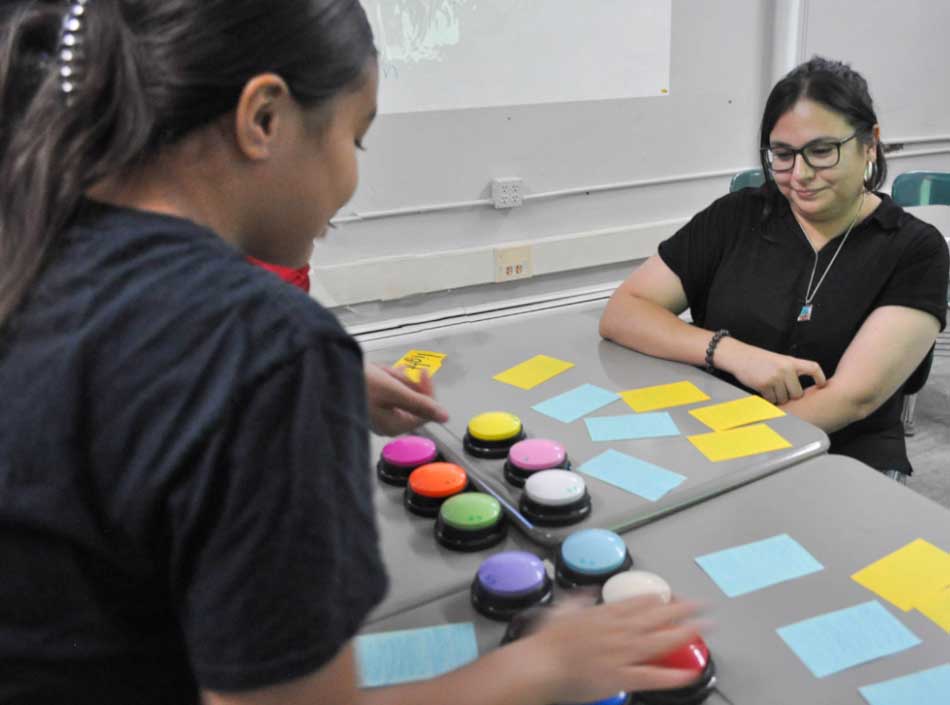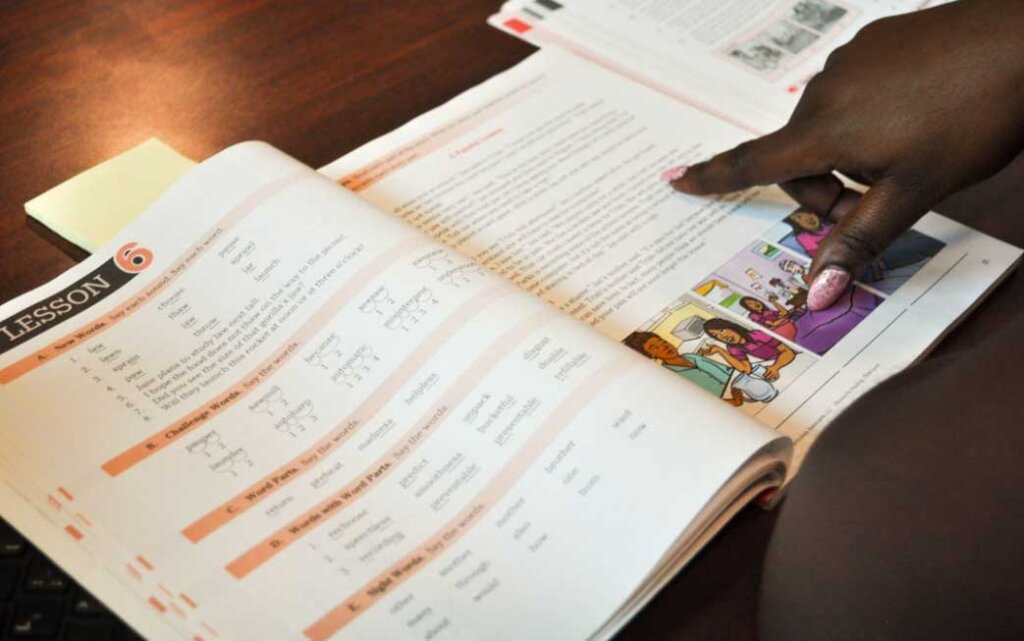SPRINGFIELD – Working as a literacy interventionist at Springfield’s South End Middle School over the summer, Alba Albo could gauge her students’ progress just by listening to them read aloud.

Albo said that when she started, her students approached written texts as if they were live electrical wires. Each word was sounded out slowly, haltingly, and with great caution. By the end of four weeks of instruction, the same students would breeze through entire paragraphs, reading faster, smoother, and with much more confidence.
“It’s really easy to tell the kids were developing fluency… because it takes them less time to go through a passage,” she said. “It was pretty cool.”
Bianca Bonsu, another literacy instructor, said her aha moment came when one of her students was able to recognize and pronounce the word “moment.”
She said that the middle school student at Springfield Conservatory for the Arts had struggled for years to read well. His strategy whenever he came upon a word he did not recognize was to scan the rest of the page looking for contextual clues. “But I taught him that most words have words you already know in them, so look for the word inside the word,” she said.
The student was reading aloud in class when he got stuck on the word “moment. But then after a pause, he said “There’s mom. I know that word – It’s ‘moment!” Bonsu recalled. “And I was like ‘Oh yeah, you’re utilizing the strategy I taught you!’”

Albo, seeking her master’s in education, and Bonsu, an undergraduate student, are each enrolled in the Cynthia A. Lyons Center for Equity in Urban Education (CEUE) at Elms College. This summer they were among 15 area college students participating in the inaugural Learn and Earn Literacy Corps, a new program sponsored by the Western Massachusetts Literacy Collaborative (WMLC).
Elms College along with American International College, Bay Path University and Westfield State University, joined with Springfield Public Schools to form the Western Massachusetts Literacy Collaborative (WMLC) to improve literacy rates amongst school aged children, PreK-12. The work and mission of the literacy corps will be highlighted Thursday, Sept. 14 in a community town hall in Veritas Auditorium from 4:30 to 7:30 p.m.
Elms President Dr. Harry Dumay and Springfield School Superintendent Daniel Warwick are scheduled to speak about the formation of the literacy collaborative as an example of what can be accomplished when different educational constituents come together for a common goal.
There will also be a showing of the film “Right to Read,” a 2023 documentary on the early reading crisis in the United States and how basic literacy in a democracy should be considered a civil rights issue.
Following the showing, there will be a panel discussion of teachers and parents about just solutions to the problem and the issuing of a call to action. The town hall is free and open to the public, but pre-registration is required.
This Education Town Hall is sponsored by the Elms College’s CEUE through a grant from the Nellie Mae Education Foundation.
The literacy collaborative is a partnership of Elms College, American International College, Bay Path University and Westfield State University, and the Springfield Public Schools. The WMLC was formed in response to a national study showing basic literacy skills among school children have fallen to levels not seen in 50 years. The National Assessment of Educational Progress, known as the Nation’s Report Card, determined reading and math skills for children declined across the board in urban, suburban and rural schools. Dr. Joyce Hampton, Elms College Dean of the School of Arts, Sciences and Professional programs, who convened the partners, sees this collaborative as a critical step in the community coming together to address literacy.
Through the WMLC, the Learn and Earn Literacy Corps was created. Fifteen graduate and undergraduate students seeking education degrees from Elms, AIC, Bay Path and Westfield Sate University were hired as Summer School Academic Reading Intervention Teachers and provided reading intervention to more than 130 students in seven elementary schools and four middle schools in Springfield. With roughly nine students per class rotation, the Learn and Earn Literacy Corps members were able to scaffolded structured literacy lessons.

Eight of the 15 Summer School Academic Reading Intervention Teachers were from Elms.
All the Learn and Earn Literacy Corps members attended a week long professional development training prior to the start of their teaching assignment that focused on culturally responsive teaching and learning strategies, the tenets of hip-hop education in literacy, relationship building with students and families, successful teaching in urban and out-of-school time learning environments, and the literacy curriculum. The training was developed by Dr. Tyra Good, founding executive director of the CEUE, and associate professor, in collaboration with our partners. Dr. Good stated that, “In order to have transformational change in our region, our approach to eradicating the literacy gap must be intentional while elevating the innate abilities that PreK-12 students and their families already possess.
The name of the literacy corps – Learn and Earn – refers to the program’s offer for participants to learn new skills while earning 3 academic credits, not to mention compensation paid by Springfield Public Schools.
“When I saw it was a free graduate course and on top of that they paid you, for me it was a no-brainer,” said Shanice Smith, an Elms graduate student seeking her master’s in education through the CEUE.
But mostly she took part because it aligned with her interests in education and the fundamental importance of literacy.
“There’s a huge component of literacy in any subject. If you are unable to read, you are unable to access the information you need for anything,” she said.
Without intervention, a student struggling to read in middle school is going to struggle to read in high school and then afterward as an adult.
“It is going to have a profound effect on you,” she said. “Imagine you don’t know how to read. That stigma is going to play out all your life.”
Laura Mendes, director of literacy for Springfield Public Schools, said four weeks of summer school is too short to measure any impact in a quantitative way. But anecdotally, she said she heard nothing but positive reviews. She would like to see the literacy corps not only return next summer but expand to reach more students in more schools.
“I have never been more optimistic about something in its early infancy as I have been with this program,” she said. “I’m so pleased and I can’t wait to do this next year.”
She said the need for literacy assistance is so great in Springfield that she said it easily could be doubled or even tripled next year. “We could certainly see us expanding into more schools.”
Yara Gonzalez, principal of the South End Middle School, also spoke favorably about the summer program and the instructors.
“It has been an awesome experience,” she said. “I hope that they continue to do the program because it is a definite need that we have.”
She said middle school teachers at her school are very skilled and dedicated, but they are simply not trained to teach basic literacy. If students pass from elementary school to middle school without those skills, there is little help available for them to gain them, she said.
“At the secondary level, we’re not traditional reading teachers,” she said. “Having individuals who are skilled in foundational reading and literacy skills has been really great.”
Laura Porter, Elms College assistant professor of special education and Interim chair of the Division of Education, said Earn and Learn has been a great success, and two of the instructors were even offered permanent teaching positions with the Springfield schools.
“We are hoping it will grow in future summers,” she said.
The literacy corps helps students improve their reading, it helps instructors improve their teaching, and it serves as a pipeline for teaching talent for inner-city schools, she said.
Porter said we would like it to expand beyond Springfield next year. When the program was being formed, organizers reached out to other districts but only Springfield was ready to go right away.
The subject of reading instruction has always been front and center in education circles, she said, but recent declines in reading scores, particularly for students of color, puts literacy “at the forefront of national news.”
The town hall is an opportunity to share the work of the Western Mass. Literacy Collaborative Education and to begin a community wide discussion with a call to action to improve the region’s literacy skills. Porter said, “That buy-in is critical to its future success.
The culturally responsive professional development training offered by the CEUE emphasized student-centered learning versus teacher-centered learning to ensure the engagement focused on integrating the students’ knowledge and interests.
Smith said that when she taught, she made a point of being with the students. “I was right next to them like we’re all in this together,” Smith said. “It’s not supposed to be a power struggle. It’s supposed to be a two-way street. I see you and you see me and where we go from here’
Bonsu, looking to graduate with her BA in education in May, has worked as a paraprofessional at Springfield’s Chestnut Middle School for 10 years. While she thought the literacy corps was a chance to teach, she also found it was a great opportunity for her to learn.
As part of the training, she was instructed to begin each class with a brief fun activity before beginning her lesson. The activity was intended to get the kids thinking and in the right frame of mind to learn before class began.
“I never thought about preparing kids to get ready to learn before,” she said. “I’ve been in the school system for about 10 years and I’ve always just accepted the kids as they were and started teaching right away.”
She also learned slowing things down was better than rushing through a prepared lesson. And she learned getting to know her students, and allowing them to know her, was also important.
“It strengthened my teaching skills,” she said.
Albo said that with culturally responsive teaching, the instructor acknowledges and embraces students’ cultures, languages and experiences – and relates them to classroom learning.
“It teaches you that if you go in there and start making demands, the students are not going to meet those demands because you’re just some person barking orders,” she said.
“The students need to know that you care about them as a person and that they are people first,” she said.